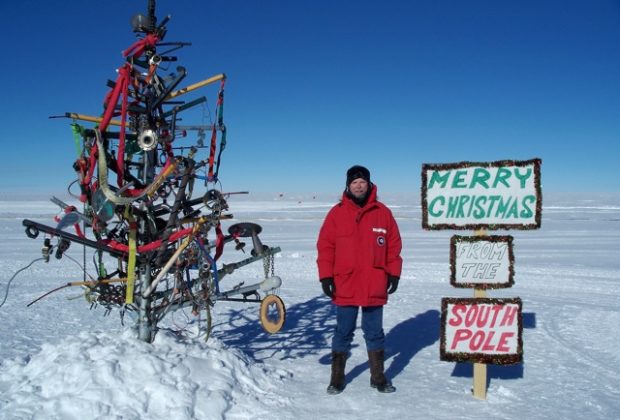Can you imagine a Christmas dinner with just a slice of butter or pulverized biscuit? Or celebrating it all by yourself, or within the small group of people far away from your family and friends?
When you live in Antarctica everything is possible. There are just several celebrations at the South Pole since it’s mostly populated with working scientists and tourists sometimes. During summer, there are 4,000 people in Antarctica, 4 times more than in winter, and they all are located on scientific bases across the continent.
Christmas at the South pole comes in the middle of the austral summer, just several days after the longest day in the southern hemisphere. That means it’s celebrated in 24-hour daylight.
Atypical Christmas Celebration
Celebration, rituals, and traditions at the South Pole are quite different from those in the rest of the world. It depends much on the nationality of the base, but all the bases usually have a Christmas supper and a gathering or a small party. Many of them spend Christmas in a tent or the hut miles from anywhere, with a single person only or a small group of people.
They all strive to have a traditional dinner, but the feasts are mainly modest and plain. Fresh vegetables and meat are not easy to come by and and they are often substituted with dried, tinned or frozen varieties.
But, there is no “Christmas rush”. First of all, there are no presents and shopping. Actually, there are no shops at all, except those with the souvenirs within several bases. Sometimes, visitors (because everyone is a visitor in Antarctica, even scientists), have presents from home that have arrived months earlier and have been saved until Christmas to be opened.
No street decorations since – no streets.

Race around the world
But there is something which can be done on Christmas only in Antarctica. A “Race Around the World” is a tradition at the American Amundsen/Scott station at the South Pole that takes place on Christmas Day. Participants can use any mode of transportation, or just walk since the race takes only few minutes.
The route actually spins around the geographic South Pole where all lines of longitude converge. So, the participants race around the world in some way.
Christmas during the Heroic Age of Antarctic Exploration
Roald Amundsen, a Norwegian explorer of polar regions kept a journal during his expedition to the South Pole. He noted that on Christmas Eve in 1911 he and his crew had a pretty “luxury” festivity, they even had a Christmas tree, a gramophone, decorations, and presents.
But the next year their Christmas celebration was unexpectedly modest. In his diary, he mentions “a capital dish” – Christmas porridge made of pulverized biscuit with a little milk. “I doubt whether anyone at home enjoyed his Christmas dinner so much as we did that morning in the tent. One of Bjaaland’s cigars to follow brought a festival spirit over the whole camp”, he wrote in his journal.
In 1913 an Australian geologist and Antarctic explorer Douglas Mawson describes his Christmas Eve: “An ounce each of butter was served out from our small stock to give a festive touch to the dog-stew.”
Some of them saved their food for the Christmas dinner. In 1912 Robert Falcon Scott and his explorers ate pemmican, horse meat with curry and onion, plum pudding, biscuits, and the desert of caramel and ginger. “We have all slept splendidly and feel thoroughly warm – such is the effect of full feeding”, it is written in his journal.
Nonetheless, the life at the South Pole, despite all adversities is extraordinary and it has some small, but precious advantages, just as one of the explorers stated during the past century:
“It’s a hard, rough, jolly life, this marching, and camping; no washing of self or dishes, no undressing, no changing of clothes. We have our food anyhow, and always impregnated with blubber-smoke; sleeping almost on the bare snow and working as hard as the human physique is capable of doing on a minimum of food.”
